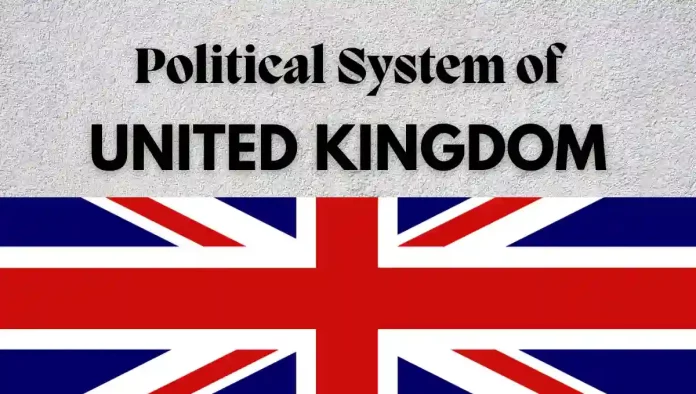The Political System of United Kingdom is consists of Parliament as well as monarchy. The Constitution of Great Britain refers to the set of laws, principles, and conventions that define the country’s political system. Unlike many other countries, Great Britain does not have a single, codified constitution. Instead, its constitution is made up of various sources of law, including Acts of Parliament, common law, conventions, and European Union law.
General Features
The British Constitution has several unique features, including its unwritten nature. This means that there is no single, authoritative document that outlines the fundamental principles of the British political system. Instead, the constitution is made up of various sources of law that have evolved over time. Another unique feature of the British Constitution is its emphasis on parliamentary sovereignty. This means that Parliament is the supreme authority in the land and that no other body, including the courts, can override its decisions. Finally, the British Constitution has a system of checks and balances, which ensures that no one branch of government becomes too powerful.
The Monarchy – The Nominal Executive
The British Monarchy serves as the nominal executive, which means that it is a ceremonial role with limited powers. The monarch has various official duties, including opening and closing Parliament, granting royal assent to legislation, and appointing the Prime Minister. However, the monarch does not have any significant decision-making authority and is expected to act on the advice of the Prime Minister and other government officials.
Cabinet – The Real Executive
The real executive power in Great Britain is held by the Cabinet, which is made up of senior government ministers appointed by the Prime Minister. The Cabinet is responsible for making policy decisions and setting the government’s agenda. It meets regularly to discuss and coordinate government business, and it is accountable to Parliament for its decisions. The Prime Minister is the head of the Cabinet and is responsible for appointing and dismissing ministers.
The Permanent Executive – The Civil Service
The Permanent Executive refers to the civil service, which is responsible for implementing government policies and running the day-to-day operations of the government. Civil servants are non-political officials who provide advice and support to the government. They are responsible for implementing the decisions made by the Cabinet and other government bodies, and they are expected to remain politically neutral at all times.
Parliament – The House of Commons
The House of Commons is the lower house of the British Parliament and is made up of 650 elected representatives. Members of Parliament (MPs) are responsible for representing their constituents and making laws. The party with the most seats in the House of Commons forms the government, and the leader of that party becomes the Prime Minister. The House of Commons is responsible for scrutinizing the government’s policies and holding it to account for its decisions.
Parliament – The House of Lords
The House of Lords is the upper house of the British Parliament and is made up of appointed and hereditary peers. Members of the House of Lords are not elected but are instead appointed by the monarch on the advice of the Prime Minister. The House of Lords is responsible for reviewing and revising legislation passed by the House of Commons, and it also serves as a forum for debating important issues. Unlike the House of Commons, the House of Lords does not have the power to initiate legislation or to veto decisions made by the House of Commons.
In a Nut Shell
Overall, Political System of United Kingdom is a complex and evolving system of laws, conventions, and traditions that has served the country well for centuries. It is characterized by its unwritten nature, its emphasis on parliamentary sovereignty, and its system of checks and balances. The various elements of the British political system work together to ensure that power is shared and that no one body becomes too dominant.
